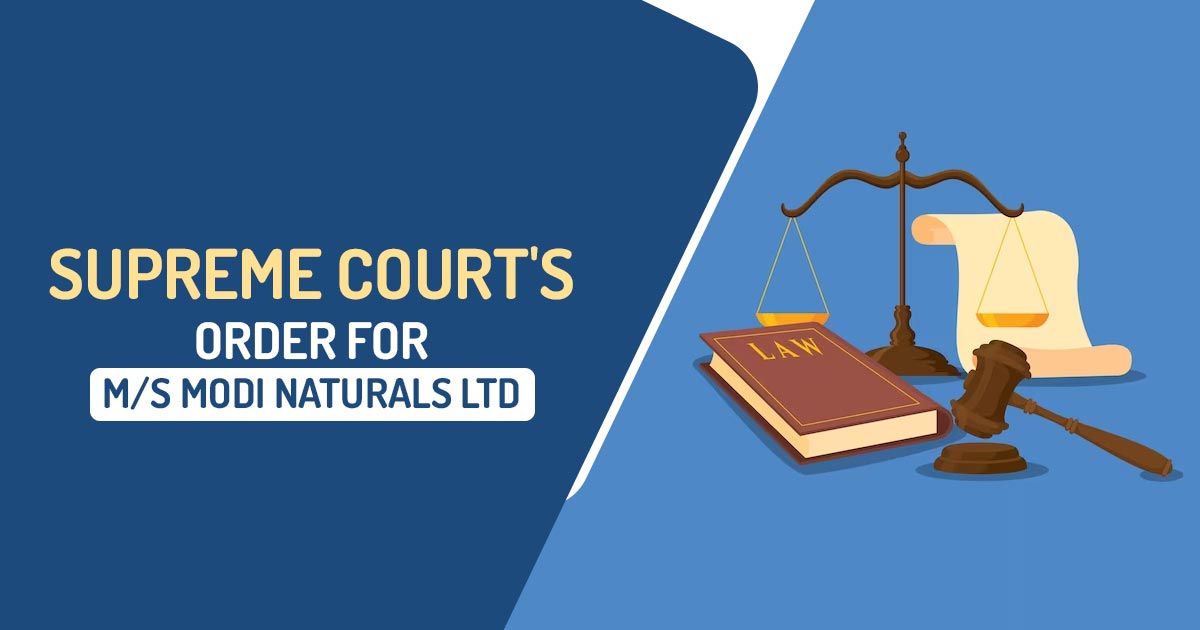
The High Court order has been quashed by the Supreme Court of India dismissing the ITC advantage claimed as the Uttar Pradesh Value Added Tax Act, 2008 (‘the UP VAT Act’) has no provision to compute the ITC apportionment.
The taxpayer Modi Naturals Ltd is a company that secures the business of manufacture and sale of Rice Bran Oil (‘RBO’) and Physical Refined RBO. The RBO manufactured by the taxpayer is counted under the ambit of “taxable goods” under the UP VAT Act. The taxpayer purchases Rice Bran (‘inputs’/‘purchased goods’) and complies with the Solvent Extraction Process to manufacture RBO.
At the time of the RBO manufacturing process, a byproduct in the form of “De-Oiled Rice Bran” (‘DORB’) is produced. DORB is counted beneath the exempted goods category under S. No. 4 of Schedule – I of the UP VAT Act.
Processing the Rice Bran in its solvent extraction plant produced 13.77% taxable goods i.e., RBO, and 83.63% by-product i.e., DORB. Through refining the RBO the physically refined RBO is indeed produced. As per the record of the AY 2013-14, the taxpayer has procured 8,21,935.71 quintals of Rice Bran for a sum of Rs. 93,69,53,404.00 and filed the tax of Rs. 4,68,47,670.00.
Within the State of Uttar Pradesh, the physically refined RBO and the balance quantity of RBO (19,939.40 quintals) were sold for Rs. 45,91,66,611 and Rs. 9,60,11,540 respectively aggregating to a total of Rs. 55,51,78,151. Rs 2,77,58,908 is the taxpayer’s tax obligation on the stated sales.
The taxpayer on the grounds of the legal provision of section 13 of the UP VAT act claimed that the complete tax amount filed as ITC came to get rejected through the Order of the Deputy Commissioner, Tax Fixation, Div. – I, Pilibhit passed in terms of Section 28(2)(i) of the UP VAT Act.
Concerning section 13(1)(f), the Deputy Commissioner believes that the taxpayer can not claim the ITC on the inputs via-a-vis the taxable sales since the final goods sale cost was lower compared to the cost of manufacturing the procured goods. For the AY 2015-16, the additional commissioner had the opinion that the taxpayer was qualified to claim the whole ITC and as per that permitted the taxpayer’s petition.
In the case of State of Karnataka v. M.K. Agro Tech Private Limited, the High Court laid on the court’s decision, in which it ruled that the dealer has no granted right to ask for the advantage of ITC since the same is only the concession via the provisions of the act. On Section 13(1)(f) of the UP VAT the High Court laid the opinion that the taxpayer is not qualified to avail the entire ITC on the inputs. The High Court consequently permitted both the revision applications that the revenue has filed.
For the taxpayer, Mr. Arvind Datar the senior counsel appeared furnished that the High Court acted in a serious error in issuing the impugned judgment. It was contended that the legal provisions beneath the Karnataka Value Added Tax Act, 2003 and UP VAT Act are separate and dissimilar. He meant that the UP VAT Act especially inscribed an exception for the by-products and waste products respectively. Despite if those are exempt goods or non-VAT Goods, the ITC is permitted.
For the state of UP, Mr R.K. Raizada the additional Advocate General appeared while opposing both the appeals. It was furnished that there is no error to speak of any error of statutory can be stated to have been executed via the High Court in issuing the impugned judgment.
Read also: An Analysis of Court Cases on Belated GST Return Filing
The High Court has committed an error in issuing the impugned judgment laid on the court decision directed in M.K. Agro Tech, as noted by the three-judge bench of Chief Justice of India Dr Dhananjaya Y. Chandrachud, Justice B Pardiwala and Manoj Misra.
The impugned common judgment along with the issued order via the High Court of Allahabad was set aside and the orders issued via the commercial tax Tribunal were restored.
| Case Title | M/S Modi Naturals LTD vs The Commissioner of Commercial |
| Case No. | Civil Appeal No (S). 5822-5823 of 2023 |
| Date | 06.11.2023 |
| Supreme Court | Read Order |








